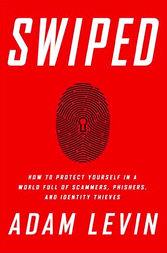A WRITER'S WIT |
My Book World

When you aren’t an expert in a particular field, you can be cowed by someone who is (supposedly) an expert. That’s how I feel as I read Levin’s book Swiped. It’s a clever title. You think at first: Oh, he’s talking about how you swipe your card in a reader when purchasing an item, and then you get caught up in the pun. He’s really talking about when someone else swipes your card and swipes it in a reader or uses it to swipe your data. As a student of rhetoric, I’m always suspicious of what seems like hyperbolic speech, oversell, overkill. At the same time, Levin could be Paul Revere, and most of us just haven't heard his cry. Although Levin’s book provides a great deal of usable information, I do believe he could have honed it down to one well-edited magazine article, and it would have been just as effective. You be the judge.
Let me share a few of the nuggets I found interesting:
“More than 500 million photographs are uploaded to major websites every day. More than 2 billion pictures are taken on mobile devices every day” (Kindle Location 85). Elsewhere Levin cautions against using geotagged photos at websites like Facebook because it can give thieves clues to your PII (personally identifiable information). It probably begins with the settings in your camera or iPhoto. I think it makes sense NOT to geotag.
“Debit cards increase your exposure to fraud. Use a credit card” (Kindle Location 578). Levin asserts that “carefully placed cameras” (by thieves?) can record PIN numbers as you enter them in an ATM or device at your favorite store. Not sure what his authority or source is on this assertion, and he’s assuming that thieves could EASILY install their own cameras at ATM stations. Seriously?
He warns against the free release of your social security number: “With your Social Security number in the wind, whoever finds it—or, more likely, whoever buys it on one of the many black-market information exchanges on the deep web—holds the keys to every part of your life. What that means—plain and simple—is that you’re going to need an efficient way to keep one eye over your shoulder, all the time” (Kindle Location 591). The paranoiac tone notwithstanding, Levin’s advice is probably good. Elsewhere in the book, he directs the reader to keep only a COPY of your Medicare card in your wallet with all but the last four numbers blacked out, the “M” or “F,” as well. This way, you can still inform someone who needs the number (medical personnel) but protect yourself from unwarranted use if someone should steal your wallet. He also warns against carrying your Social Security card (or copy) for the very same reasons.
At one point Levin makes a list: “We expose our most sensitive personal information any time we
Pick up a phone, respond to a text, click on a link, or carelessly provide personal information to someone we don’t know;
Fail to properly secure computers or devices;
Create easy-to-crack passwords;
Discard, rather than shred, documents that contain PII;
Respond to an email that directs us to call a number we can’t independently confirm, or complete an attachment that asks for our PII in an insecure environment;
Save our user ID or password on a website or in an app as a shortcut for future logins;
Use the same user ID or password throughout our financial, social networking, and email universes;
Take [online] quizzes that subtly ask for information we’ve provided as the answers to security questions on various websites.
Snap pictures with our smartphone or digital camera without disabling the geotagging function;
Use our email address as a user name/ID, if we have the option to change it;
Use PINS like 1234 or a birthday;
Go twenty-four hours without reviewing our bank and credit card accounts to make absolutely sure that every transaction we see is familiar;
Fail to enroll in free transactional monitoring programs offered by banks, credit unions, and credit card providers that notify us every time there is any activity in our accounts;
Use a free Wi-Fi network [i.e. cafés or even airports] without confirming it is correctly identified and secure, to check email or access financial services websites that contain our sensitive data” (Kindle Location 668-678). These tips are all good advice. I only question whether we need to check our accounts EVERY DAY. Perhaps every second or third day, even once a week?
“The deep web is a hidden part of the Internet. It consists of a vast number of sites, most of them thoroughly boring, that can’t be found by a traditional search engine like Google. To access these sites, you need a password, a specific URL, a sophisticated understanding of how computers communicate, or sometimes all of the above. The deep web is four hundred to six hundred times larger than the ‘surface web,’ that is, the familiar sites you can access via search engines and see every day” (Kindle Location 781).
Hm, yes, okay. On the one hand, I want to run screaming into the street. On the other, I want to laugh. So . . . the deep, dark web is LARGER than our mere regular Internet? But it is also harder to break into? Perhaps the underworld of crime has always been that way, but something about Levin’s tone makes me wary. Moreover, he repeats many, many times that everyone, EVERYONE, will be hacked or in some way attacked by parties wanting access to our personal digital information. Mathematically, that doesn’t seem possible. It’s like saying EVERYONE will have a car accident in his or her lifetime, or EVERYONE will contract TB or AIDS. Some people just won't.
All these admonitions, in a nutshell, are what Levin’s book is about. If I were to liken it to a musical form, I would say it is a rondo: Theme ABACADA or perhaps Variations on a Theme. He keeps repeating the same themes in slightly different ways. A full quarter of the book consists of five appendices, which repeat oft-harped-on information presented earlier.
Again, Levin seems to offer the reader/consumer/citizen-of-the-world valuable data, but his Paul Revere appeal could have been reduced to bite-sized pieces. He could have skipped many of the useless or situation-specific anecdotes and provided the reader with a little card to keep in the wallet or purse. Sometimes too much information can also be too little.

Introduction to My Long-Playing Records
"My Long-Playing Records" — The Story
"A Certain Kind of Mischief"
"Ghost Riders"
"The Best Mud"
"Handy to Some"
"Blight"
"A Gambler's Debt"
"Tales of the Millerettes"
"Men at Sea"
"Basketball Is Not a Drug"
"Engineer"
"Snarked"
"Killing Lorenzo"
"The Age I Am Now"
"Bathed in Pink"
Listen to My Long-Playing Records Podcasts:
"A Certain Kind of Mischief"
"The Best Mud"
"Handy to Some"
"Tales of the Millerettes"
"Men at Sea"
"My Long-Playing Records"
"Basketball Is Not a Drug"
"Snarked"
"Killing Lorenzo"
"Bathed in Pink"
Also available on iTunes.


 RSS Feed
RSS Feed